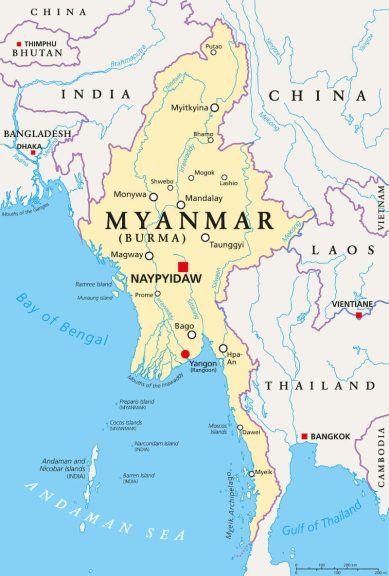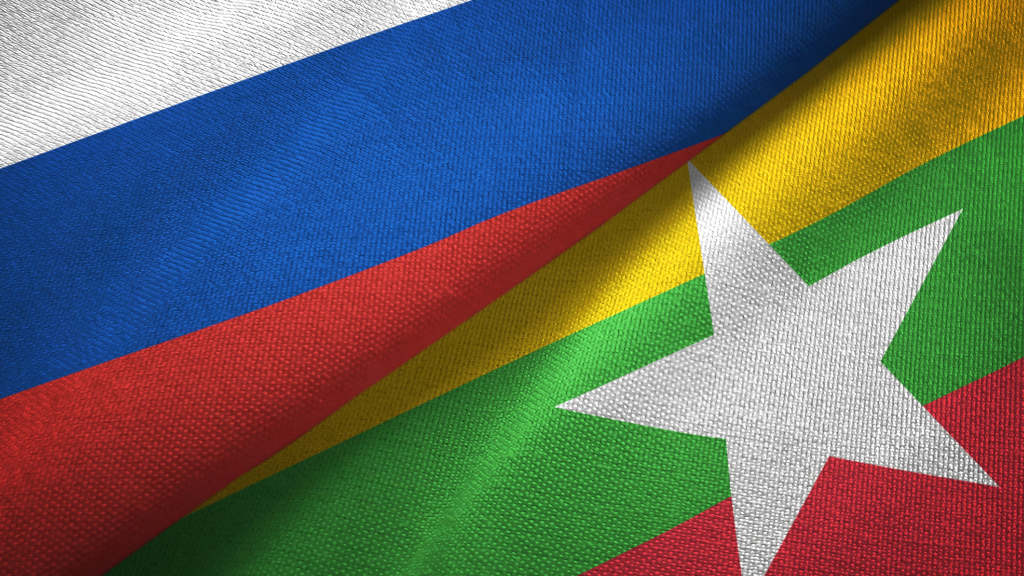The Russian President, Vladimir Putin, has met with Min Aung Hlaing, the Acting President of Myanmar.
Taking part in the conversation on the Russian side were Deputy Chief of Staff of the Presidential Executive Office Maxim Oreshkin, Deputy Chief of Staff of the Presidential Executive Office – Presidential Press Secretary Dmitry Peskov, Presidential Aide Yury Ushakov, Finance Minister Anton Siluanov, Energy Minister Sergei Tsivilev, Governor of the Central Bank Elvira Nabiullina, Director of the Federal Service for Military-Technical Cooperation Dmitry Shugayev, Deputy Foreign Minister Andrei Rudenko, Deputy Defence Minister Alexander Fomin, Deputy Minister of Economic Development Vladimir Ilyichev, and Director General of the State Atomic Energy Corporation Rosatom Alexei Likhachev.

Hlaing stated that “I recently visited Moscow and attended a parade marking the 80th anniversary of Victory in World War Two. Our countries established diplomatic relations 77 years ago. The Embassy of Myanmar has now been built in Moscow to promote closer relations between our countries. We have also opened consulates general in St Petersburg and Novosibirsk, and we plan to open a consulate general of Myanmar in Vladivostok shortly. Russia is a big country. If we look east and west, we will see that you have a vast territory, which is why we are opening Myanmar’s consulates general to promote cooperation between our countries.”
Amid the re-orientation of trade from the West to Asian markets, Russia has been expanding its trade and investment ties with South Asian countries. Among them, Myanmar stands out as a promising market for Russian companies that are willing to fill in the niche created by the exit of major Western companies that also left Myanmar after the 2021 military coup.
The Western sanctions imposed on Russia pushed the latter to re-assess its approach to Southeast Asia, and as a result, Moscow has since re-invigorated bilateral political and economic ties with Naypyidaw.
This expansion fits into the overall Russian thinking toward foreign trade but also serves as preparation for further growth of commercial ties with Southeast Asia especially given that Myanmar is a significant member of ASEAN. Myanmar also enjoys direct access to China, India, and ASEAN countries through ports in the Bay of Bengal and the Andaman Sea and ASEAN free trade agreements. That means that products manufactured in Myanmar and containing a certified percentage of local components (this varies from product to product, and is referred to in the ‘Rules of Origin’ agreements) – can be exported duty free to these markets. Myanmar has also applied to join the BRICS group as a partner nation.
Myanmar is the largest country by area in mainland Southeast Asia at 676,579 km2 and has a population of about 55 million. It is under sanctions, with a history of military juntas rising to overthrow democracies seemingly unable to deal with Islamic insurgents in the north. Battles with the dispossessed Rohingya factions continue. Myanmar has a GDP (PPP) of about US$284 billion, a GDP (PPP) per capita of about US$5,200, with a GDP growth rate for 2025 estimated at 1.1%. The economy remains subdued due to the effect of sanctions.

However, when it comes to Russia, the recent progress in bilateral trade has been impressive. In 2020-21 it stood at US$15.7 million, by the end of 2024, this had increased to about US$288 million. Myanmar’s Ministry of Commerce projects that the trade between the two countries has the potential to increase to US$1 billion.
Russia’s exports to Myanmar mainly consist of hard coal, three-component fertilizers, diammonium phosphate, refined sunflower oil, ammonium sulfate, anthracite, bulk semi-finished products, and unvulcanized rubber. The top Russian imports from Myanmar include men’s and women’s outerwear, and footwear.
Moving into larger investments however, Russia has also expressed interest in Myanmar’s energy sector, with Myanmar expressing interest in importing LNG and other energy resources from Russia. Myanmar is also interested in expanding the presence of Russian oil and gas companies, with the country possessing significant reserves of unexplored oil, natural gas, minerals and forest resources. This sector has traditionally attracted a significant portion of FDI into the country and has also made a significant contribution to GDP and the growth of exports.
The two countries are also exploring cooperation in nuclear energy, with Rosatom saying that “the Russia-Myanmar intergovernmental agreement includes the implementation of a small NPP with a capacity of 110 MW, and the possibility of further expansion to 330 MW.” Rosatom are also planning to build wind farms in Myanmar with a capacity of 172 MW and 200 MW.
In June 2023 a memorandum of cooperation was signed between the Eurasian Economic Commission (EEC), the directive body of the Eurasian Economic Union (EAEU), and Myanmar which aims at increasing cooperation in such areas as regional economic integration, customs regulation, energy and transport. The two countries signed a bilateral investment treaty in June.
Related to this, in September 2023, direct air traffic between Russia and Myanmar resumed after a 30-year break and the two countries also signed a memorandum of understanding on tourism development the same month. A visa-free policy was introduced earlier this month.
Myanmar has also announced plans to join the Russian equivalent of SWIFT (SPFS), while the country’s officials have begun using the Chinese RMB Yuan and Ruble in trade settlements between the two countries.
In a cultural first, a Russian Orthodox Church is currently being built in Yangon.
Despite economic sanctions affecting both countries, the overall bilateral trade trends between Russia and Myanmar remain positive and are continuing to develop.
Meanwhile, on the same day (September 25), the Russian Deputy Foreign Minister, Sergey Vershinin met with UN Secretary-General’s Special Envoy on Myanmar, Julie Bishop, at the United Nations in New York. The dialogue included an exchange of views on the situation in Myanmar, focusing on the challenges faced by the country and the forthcoming elections. It was emphasised that the primary responsibility for determining the pathways to settlement rests with the Myanmar people themselves, while the international community should extend assistance solely upon their request. Bishop, who was previously the Deputy Prime Minister of Australia, was urged to conduct her activities in a neutral and impartial manner, with particular emphasis on the necessity of establishing constructive engagement with the Government of Myanmar.
Further Reading

 Русский
Русский














